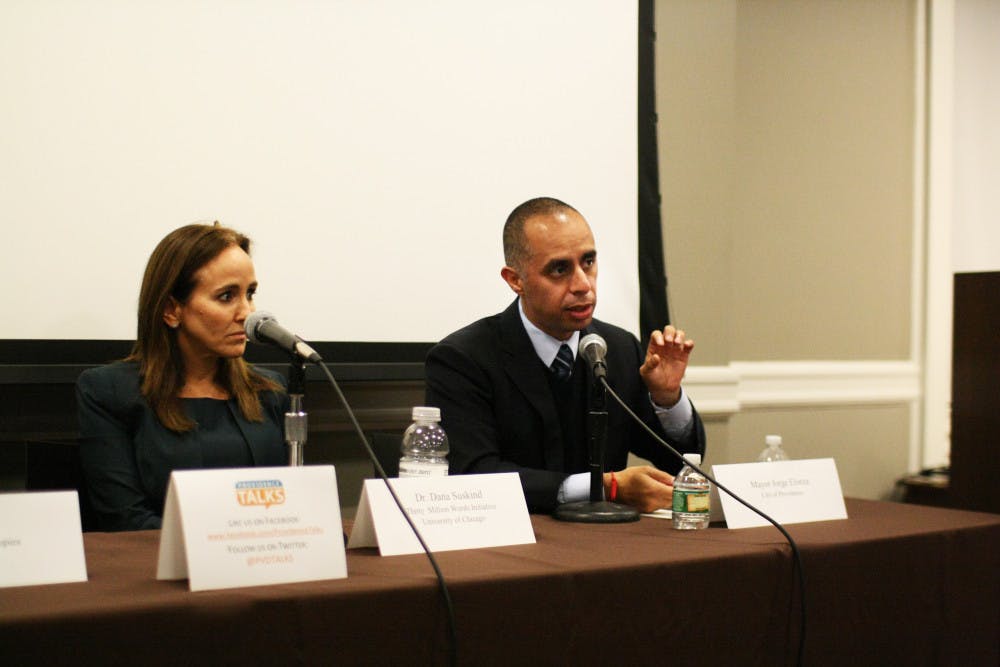Mayor Jorge Elorza joined three other panel members, including University of Chicago Professor of Surgery Dana Suskind, to discuss Providence Talks — a 2013 initiative designed to improve children’s vocabularies — at a policy forum in Petteruti Lounge Monday. The panel members focused on the necessity of increasing children’s vocabularies during the first few years of life in order to reduce the gap in children’s readiness for kindergarten.
Suskind introduced her book released last month, “Thirty Million Words: Building a Child’s Brain,” during the panel and was available to sign copies afterwards.
The Providence Talks program — which emphasizes the importance of enhancing parent-child interactions to improve learning — won the Bloomberg Philanthropies’ 2013 Mayor Challenge and received $5 million to fund its implementation. In addition to Elorza and Suskind, the policy forum, which was the first since the program’s inception, also featured Anne Emig, a representative from Bloomberg Philanthropies and Kenneth Wong, professor of education and chair of the department.
Suskind also serves as a surgeon at the University of Chicago, and she said her experience with pediatric cochlear implants — which enable deaf children to hear — has allowed her to see the “indelible impact” of language on children’s growth. Cochlear implants open up a whole new world for children born to silence, but there were noticeable differences in individual children’s language abilities after the implantation. Some had language abilities on par with peers, while others were barely able to communicate, Suskind said.
“That difference almost always fell along socioeconomic lines,” she said. “It was a very painful difference to see.”
According to the Providence Public School Department Office of Research, only 52 percent of fourth grade students in Providence public schools read at grade-level proficiency. In an effort to combat this issue, Providence Talks uses technologies from the LENA Research Foundation — including recorders, analysis software and mobile services — to develop a comprehensive picture of language environments and to achieve its goal of closing the vocabulary gap among pre-kindergarteners. Participating families receive a free LENA pedometer and bi-weekly mentoring from trained home visitors, as well as information on resources such as read-aloud programs at libraries.
“The implementation of Providence Talks is also aligned with my personal vision and commitment to building strong community schools where each of our children continue to grow,” Elorza said, adding that at the core of the initiative is the belief that children’s most important early teachers are their parents.
The program has already served 170 families and is set to expand its reach to 750 more families within the next year, Elorza said, adding that 1,200 books have already been distributed to families and the program intends to distribute another 10,000 books over the next few years. According to a report published by Providence Talks, those who start out at the lowest income levels have made impressive progress — on average, the number of words used at home increased by 50 percent.
By the end of the fourth year of life, “children born into poverty will have heard 30 million fewer words than their more affluent peers,” Suskind said. Her book speaks to parents from all backgrounds on the critical importance of language exposure when a child’s ability to absorb words is at its prime — studies have long indicated that the first three years of a child’s life are the most crucial to language development.
With the implementation of Providence Talks, the city is setting an example by “putting the power back where it belongs — with parents,” Suskind said. But in order for a program like Providence Talks to flourish, parents must be backed by social policies that advocate for low-income guardians so they can invest in their own children. “When we advocate for the power of parent-talk, we must also advocate for the parents,” Suskind said.





